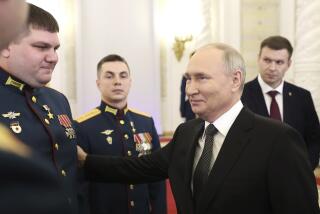PERSPECTIVE ON RUSSIA : Yeltsin Gets to Pursue His Grand Design : His task is to persuade America that the Soviet Union will become a loose confederation of sovereign states.
- Share via
Having scored an impressive first-round victory in Russia’s elections on Wednesday, President-elect Boris Yeltsin is poised to relaunch his challenge to Mikhail Gorbachev.
According to several of Yeltsin’s closest advisers and principal supporters, the Russian leader’s recent rapprochement with Gorbachev--through the “nine-plus-one” agreement (so called because it deals with the relationships between the nine republics involved and the central government) of April 23--was a temporary tactical maneuver designed to buy peace in the weeks before the elections.
“Yeltsin is a man of radical, democratic inclinations,” said Anatoly Malykhin, the leader of Russia’s miners and a deputy to Russia’s Parliament. “But he is surrounded by cautious advisers who sold him on the need to lower the political temperature.”
The maneuver had a downside. While Yeltsin was out in the hustings, Gorbachev pressed the West in a bid to strengthen his hand in defining nine-plus-one in negotiations with the republics. Now it is Yeltsin’s turn to fight back. Already, he has challenged Gorbachev’s interpretation of nine-plus-one by rejecting the Soviet leader’s ban on strikes, criticizing his efforts to place key industries under virtual martial law and denouncing renewed repression in the Baltics.
Flush with an impressive electoral victory, Yeltsin prepares to visit the United States next Tuesday to carry his message to the American people. As Yeltsin himself put it while on the campaign trail in Murmansk on May 28, the Russian federation “should manage its own resources autonomously and should maintain businesslike ties with other sovereign states directly, and not through the center.”
Yeltsin’s biggest task, says a Russian Foreign Ministry spokesman, Andrei Kolosovsky, is to persuade opinion-makers that the Soviet Union will soon be transformed into a loose confederation of sovereign states. The central government’s role will be limited to supervising a unified transportation and communications system, maintaining an effective Soviet-wide energy grid, coordinating large ecological initiatives and promoting trade among the republics.
Yeltsin’s grand design for the Soviet Union thus foresees an economic union similar to the European Community and a security arrangement with a central military command resembling NATO’s. Decisions on the placement of troops and nuclear weapons on their territory would be a matter for each of the sovereign states.
“You would have nuclear and nuclear-free republics, just as you have under the NATO umbrella. Republics less inclined to contribute troops to the defense shield would be obliged to make larger financial contributions,” said Kolosovsky, who is in the United States as Yeltsin’s advance man. Unlike NATO, nuclear weapons would remain in the hands of the central military command.
With the inexorable collapse of the Communist Party, the military looms as the greatest obstacle to the dismantling of the Soviet empire and to privatizing the economy. The military has a presence in 70% of Russia’s workplaces; in the neighboring Ukraine, it accounts for 40% of economic output. Thus, no devolution of power to sovereign republics can come unless the military and the military-industrial complex are reorganized. Here, Yeltsin’s task will be to persuade U.S. arms-control negotiators to build down weapons in a way that advances the dismantling of the military stranglehold on the republics. In an interview with Radio Liberty, Yeltsin made it clear that he would have a big role in determining military issues. He said that the Russian republic intends to take control of weapons-manufacturing plants on its territory, and that “Russia won’t trade arms.”
A second goal of Yeltsin’s visit will be to woo U.S. investors to Russia. Yeltsin will no doubt emphasize his commitment to the withdrawal of the state from total control of economic life and will underscore his recent pronouncement that the role of government in the economy is to collect taxes. Finally, he will use the trip to reach out to trade unions and other non-government organizations for help in rebuilding democratic civic life.
Strengthened by the legitimacy of an electoral mandate and facing a central government afflicted by disarray and disunity, Yeltsin aides are sounding ever more confident. Referring to Gorbachev’s role in the new confederal union, one Yeltsin aide recently put it this way: “The more accommodating he is the more he will have to do. The more problems he creates, the less Gorbachev will end up with.”
Dr. Bella Denisenko, Russia’s deputy health minister and a key leader of the Democratic Russian coalition that waged Yeltsin’s grass-roots campaign, put it even more starkly when I spoke to her in Moscow last month: “Gorbachev will be the first and last president of the Soviet Union . . . . Democracy will only grow on the basis of the republics.”
On his last trip to the United States, Boris Yeltsin was treated as a reckless and flamboyant politician inclined to populistic sloganeering. At home, however, Yeltsin has come to be perceived as a visionary and charismatic leader who has earned the respect of some of his toughest critics--former political prisoners and human-rights advocates.
As the legitimately elected president of a republic, Yeltsin deserves to be treated as what he soon hopes to become--the leader of a sovereign state eager to find its place within the democratic community of nations. It is time for the West to acknowledge his role and to treat his coming mission with the respect that the enterprise deserves. After all, Yeltsin may well be the founder of a new democratic Russian state and the principal architect of a peaceful end to the Soviet empire.
Many obstacles still stand in the way of Yeltsin’s grand design. Not least among them is whether our government will recognize the immense opportunity posed by the emergence of this dynamic figure onto the world scene.
More to Read
Sign up for Essential California
The most important California stories and recommendations in your inbox every morning.
You may occasionally receive promotional content from the Los Angeles Times.













